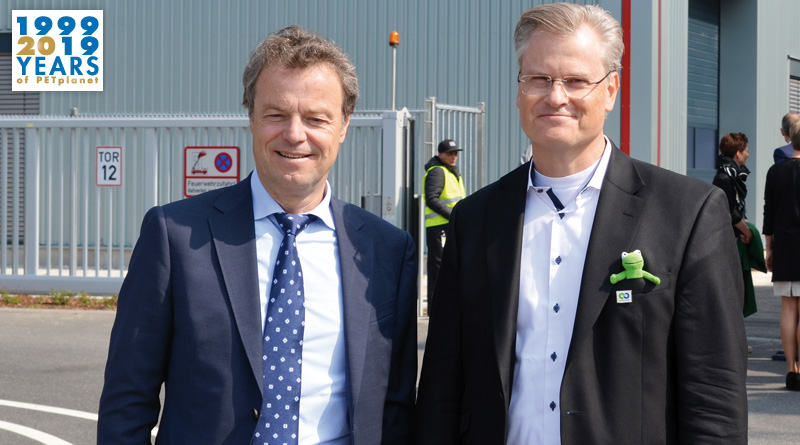“There is no alternative to plastic recycling”
PETplanet spoke with Mr Günther Lehner, CEO of Alpla, on the occasion of the opening in May 2019 of Werner & Mertz’s new production building. It is characterised by a sophisticated sustainability concept in line with the company’s sustainable philosophy. Together with its long-standing partner, Alpla has implemented a common vision in Mainz, Germany.
“We have been working together for over 20 years”, Günther Lehner laughed, “probably for 30 years already. Since 1996 we have been here in Mainz at Werner & Merz. Before the opening of the new hall we produced in a different building, now we are fully integrated into the production flow”, he explained. In Mainz the bottles for the detergent manufacturer Werner & Merz, known for its brand Frosch, are produced on Alpla machines. Production has been growing steadily ever since. In the last ten years this was achieved with the focus on the Frosch brand, where the product range was expanded.
The preforms are delivered from the nearby Alpla site in Kaiserslautern and consist of 100% rPET. Up to 20% of the recycled PET for the rPET preforms comes from the German yellow bag, which means that it is 100% post consumer PET. This is due to the reycyling initiative of K. Reinhard Schneider, CEO of Werner & Mertz (see PETplanet 4/2019).
“Especially detergents and shampoo bottles from the yellow bag are recycled. PET beverage bottles are recycled in Germany via a deposit system. The challenge is sorting and processing of post consumer material out of the yellow bag”, Lehner continued.
For the new production hall, there was a renewed machine park, special attention was paid to energy efficiency. There are now four PET and four polyolefine lines. Together with Werner Mertz, Alpla designed the entire production line from filling to logistics. In addition to flexibility, the avoidance of secondary packaging was an important factor. “In any case, we proved that it is possible to use 100% rPET material, we have the know-how and know what the material has to be able to do. We run it with the same efficiency as virgin PET, without losses during production or filling”, Lehner proudly reported.
PETplanet asks for his opinion on the subject of EU directives and the problem of material procurement. “In the next 1-2 years it will be exciting to see how the individual countries position themselves in relation to how each country meets the requirements! There is a European dilemma, which means each country has its own procedures and waste management system. This makes it difficult to find enough PET material that can be recycled again.”
Alpla invested in its own recycling plants at an early stage in order to have the knowledge of the challenges posed by post consumer material. “This knowledge has now helped us here at Werner and Mertz. Even though Europe is fragmented, there is a clear trend towards collecting the important material flows to make them available for recycling, but it is still a big challenge not to lose the high quality material to other processing industries, such as the fibre or sheet industry – to be truly circular“, Lehner stated. Therefore Lehner wanted long-term supply contracts to get away from the spot market.
“The German deposit scheme is unfortunately not a 100% a good example either, the material ends up in retail and the one that offers the most gets it. The material is publically auctioned in Italy and Spain. The idea of recycling has to be focused more strongly so that bottle to bottle can be realised – so in a fact really closing the loop. The used plastic bottles are no waste, they are a valueable material that must go back into bottle packaging again. In recent years we have also had to struggle with our two recycling sites, where customers were only interested in the recycled material if it was cheaper than the virgin material.
Since the last two years we are sold out, so we see that something has changed. Mechanical recycling is a much optimised process, a good basis. Chemical recycling also has its advantages and could possibly complement the mechanical recycling to fulfil the EU targets. Of course the price will always play a role; you can’t be blue-eyed. But already many of our big customers follow what we see here at Werner & Merz in absolute consistency. We believe that recycling is the solution, and our attitude is the same as that of Werner & Mertz. Our packaging is mainly made from plastic so we continue to invest in bottle to bottle recycling. For plastics, recycling is the solution,” summarised Lehner in conclusion.

